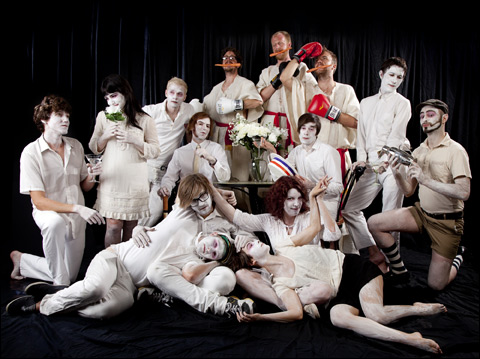
DRAMATIS PERSONAE: From the ’90s-era Elephant 6 days to this month’s release of 10th studio album False Priest, Of Montreal have stoked a flamboyant fire in indie rock. |
"I've always been drawn to a density of ideas," states Kevin Barnes, plaintively. If you have even a passing familiarity with Barnes and the music he's made for the past 15-plus years with his glammed-out-chamber-pop Athens (Georgia) ensemble Of Montreal, then you probably retorted to that line with an emphatic "Duh!" If you aren't familiar with the man, let me spell it out: Barnes's music is overstuffed with "a density of ideas" the way Picasso's Cubist paintings occasionally had some cubes in them. It's all part of how he fills every microsecond of every Of Montreal song with little pieces and parts and zigs and zags, until listening to one becomes a minefield of whizzing thoughts and changes.
Placed in context, Barnes's kitchen sink fits: as a somewhat latter-day participant in the loose collective of bands and musicmakers known as Elephant 6, Of Montreal were of a kind with fellow over-creators like Olivia Tremor Control, Neutral Milk Hotel, and Apples in Stereo. "When I was around all of those guys, in the '90s," he explains, "the idea when making an album was, you know, 'Just fill that CD up with as much material as possible!' Seventy-two minutes, or whatever the limit is! I was surrounded by all these creative people bounding with all of this stuff, and it seemed a shame if you made an album and it was
only 45 minutes."
Even from the start, though, there was always a crucial distinction between the doe-eyed psych of the rest of Elephant 6 and the restless theatricality of Barnes and Of Montreal. Perhaps it was the way that "Panda Bear" (from 1998's Bedside Drama: A Petite Tragedy) and "Jacques Lamure" (from 1999's The Gay Parade) veer off in a thousand directions, each refracting bright light or dark matter, depending on how hard you listened. Or maybe it was the way Barnes was beginning to inhabit quasi–alter egos in order to discover new methods of expression.
"For a while," he says, "I had a lot of musical ideas that were all about falsetto singing and sort-of-sexual content. So I kind of used these other characters as a device — but it's organic, it's just this thing that sort of happens, a kind of Dr. Jekyll and Mr. Hyde thing. I sort of become this character, and I'm familiar with that character, and I don't censor it, I don't have to say, 'Oh, I can't say that in a song.' Instead, it's like, 'Oh hell, yeah, okay, I'm gonna do this now.' It's really exciting and liberating and empowering in a strange way."